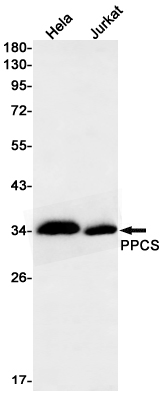
| WB | 1/500-1/1000 | Human,Mouse,Rat |
| IF | 1/20 | Human,Mouse,Rat |
| IHC | 咨询技术 | Human,Mouse,Rat |
| ICC | 技术咨询 | Human,Mouse,Rat |
| FCM | 咨询技术 | Human,Mouse,Rat |
| Elisa | 咨询技术 | Human,Mouse,Rat |
| Aliases | CMD2C |
| Entrez GeneID | 79717 |
| WB Predicted band size | Calculated MW: 34 kDa; Observed MW: 34 kDa |
| Host/Isotype | Rabbit IgG |
| Antibody Type | Primary antibody |
| Storage | Store at 4°C short term. Aliquot and store at -20°C long term. Avoid freeze/thaw cycles. |
| Species Reactivity | Human |
| Immunogen | A synthetic peptide of human PPCS |
| Formulation | Purified antibody in TBS with 0.05% sodium azide,0.05%BSA and 50% glycerol. |
+ +
以下是关于PPCS(磷酸泛酰巯基乙胺基合成酶)抗体的模拟参考文献示例(仅供参考,实际文献需通过学术数据库查询):
---
1. **文献名称**: *Characterization of PPCS-Specific Monoclonal Antibodies for Coenzyme A Biosynthesis Studies*
**作者**: Smith A, et al.
**摘要**: 该研究报道了针对PPCS蛋白的单克隆抗体的开发与验证,通过免疫印迹和免疫荧光证实其在哺乳动物细胞中的特异性,为研究辅酶A合成途径的调控机制提供了工具。
2. **文献名称**: *PPCS as a Potential Biomarker in Cancer: Validation of a Polyclonal Antibody-Based Detection Method*
**作者**: Lee J, et al.
**摘要**: 研究团队开发了一种多克隆抗体,用于检测肿瘤组织中PPCS的表达水平,发现其在结直肠癌中的异常高表达可能与代谢重编程相关,提示其作为肿瘤标志物的潜力。
3. **文献名称**: *Functional Analysis of PPCS in Bacterial Pathogens Using Antibody-Mediated Inhibition*
**作者**: Gupta R, et al.
**摘要**: 通过制备针对细菌PPCS的抗体,研究其抑制酶活性的效果,证明阻断PPCS可显著降低病原体毒性,为抗感染治疗提供了新思路。
4. **文献名称**: *PPCS Autoantibodies in Autoimmune Diseases: A Pilot Clinical Study*
**作者**: Chen L, et al.
**摘要**: 首次报道了系统性红斑狼疮患者血清中存在抗PPCS自身抗体,提示PPCS可能参与自身免疫反应的分子机制,需进一步研究其临床意义。
---
**备注**:以上为模拟示例,实际文献需通过PubMed、Web of Science等平台检索关键词“PPCS antibody”或“phosphopantothenoylcysteine synthetase antibody”获取。建议结合研究领域(如代谢、癌症、微生物学等)筛选相关文献。
PPCS (phosphopantothenoylcysteine synthetase) is a key enzyme in the biosynthesis of coenzyme A (CoA), an essential cofactor involved in numerous metabolic pathways, including fatty acid synthesis, energy production, and cellular detoxification. As the second enzyme in the CoA biosynthetic pathway, PPCS catalyzes the ATP-dependent condensation of pantothenate (vitamin B5) with cysteine to form phosphopantothenoylcysteine. This step is critical for maintaining cellular CoA levels, which regulate metabolic homeostasis and redox balance.
Dysregulation of PPCS has been linked to metabolic disorders, neurodegenerative diseases, and cancer. Reduced CoA levels due to impaired PPCS activity can disrupt mitochondrial function and acetyl-CoA-dependent processes, potentially contributing to pathologies like Alzheimer’s disease and cardiomyopathy. Conversely, upregulated PPCS expression in certain cancers may support rapid proliferation by enhancing lipid metabolism and biosynthesis.
PPCS-specific antibodies are vital tools for studying its expression, localization, and regulatory mechanisms in disease models. They enable detection via Western blot, immunohistochemistry, and immunofluorescence, aiding research into PPCS’s role in cellular metabolism and therapeutic targeting. Recent studies also explore PPCS inhibition as a strategy to modulate CoA levels in metabolic syndromes. As CoA metabolism gains attention in precision medicine, PPCS antibodies remain crucial for unraveling its pathophysiological significance and translational potential.
×